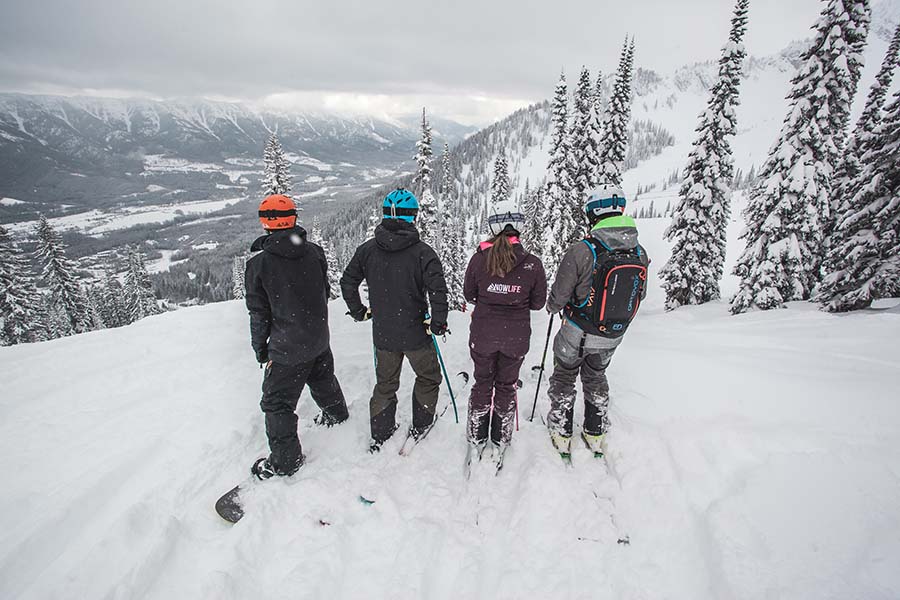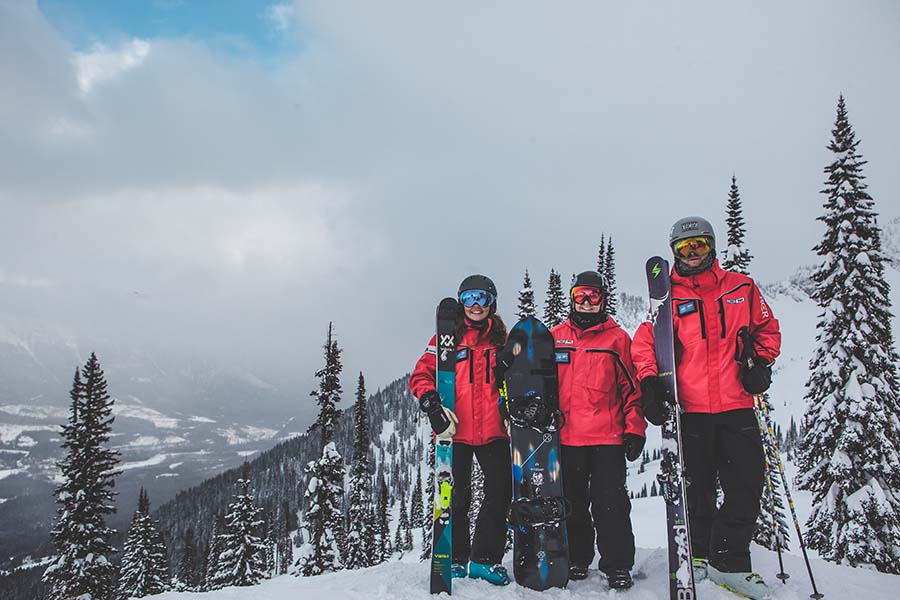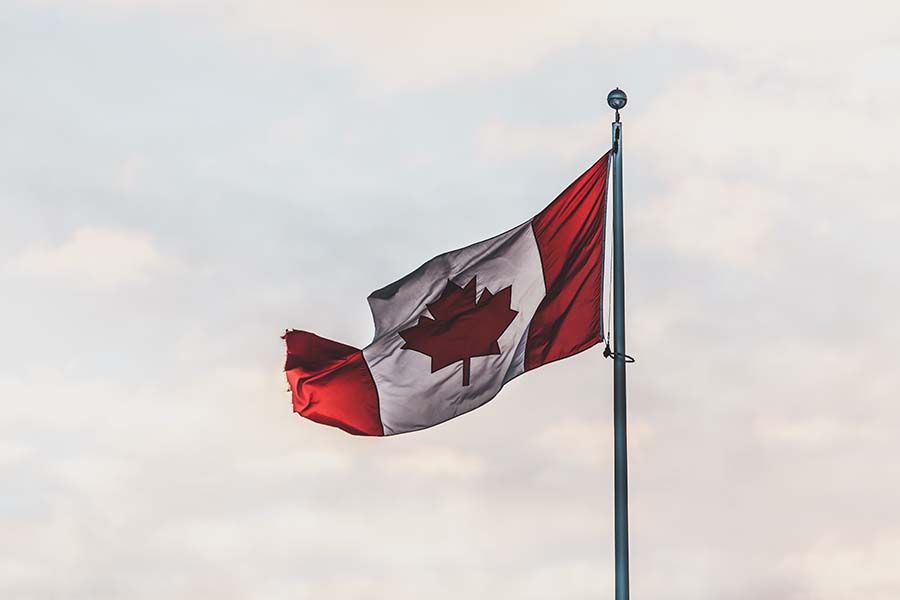- About
- Courses
-
Destinations
EuropeNew Zealand
- Journal
- Contact
Signing yourself up to a ski or snowboard instructor course can be a life-changing decision. Heading down this route will take your skills to a sky-high level and open the door to a life and career in the mountains.
Whether you’re totally invested in the idea or just exploring your options, digging deeper and reflecting on your goals will help you choose the right training pathway. This handy guide covers some of the key questions you may have, from who does a ski instructor course to which qualification is best?
What can you expect from an instructor course?
Ski and snowboard instructor courses are designed to take your skiing or riding ability to a professional level with comprehensive on-snow coaching, culminating in achieving world-recognised instructor qualifications. The training will fully prepare you on all the criteria to pass instructor exams, developing your technique and performance as well as teaching you how to teach others.
Far more than preparing you for the certifications, the best courses focus on creating great skiers and snowboarders and allow you to live a true mountain lifestyle. You’ll develop your technique across in the mountain, grow your love and knowledge of the sport, and be guided in ways of mountain life, all with a great crew of people.
Who does a ski instructor course and for what reasons?
Ski and snowboard instructor courses attract people from all walks of life, and of all ages. Anyone with a passion for their sport and a desire to progress their skills to as high a level as possible will find themselves in good company.
People do ski and snowboard instructor courses for a variety of reasons:
Whatever your motivations for doing a course, you’ll immeasurably improve your technique and experience an enviable lifestyle. The mix of like-minded people, all with their own story, is what will make your time in the mountains truly memorable.

Is a ski instructor course suited to a gap year or career break?
Absolutely. Whether you plan on using the qualifications or not, training to become an instructor is truly the ultimate way to push your limits and develop your ability. The training will set you up with an extremely strong technical foundation to advance your skiing or snowboarding, and give you knowledge you can take forward for the rest of your life. You’ll experience life in a ski town, make new friendships and come out a transformed skier or snowboarder.
And while you may have no designs on becoming an instructor right now, you never know where your course could lead. A season in the mountains may change your outlook on life and force you to reassess what really matters. We’ve seen people use their qualifications in unexpected ways, change their career plans, create businesses, compete for national teams, or simply move to the peaks.
What instructor qualifications are available and what do they mean?
The ski and snowboard qualifications on offer vary. All are issued by a national governing body and overseen by the ISIA (International Ski Instructors Association). The most popular ISIA-affiliated systems are:
While there are subtle differences, most systems are relatively similar, with four certification levels and similar international recognition.
Check out this guide to ski instructor qualifications for more information.
WHICH QUALIFICATION IS BEST?
There is no simple answer here. The qualification that is best for you will depend on your goals.
For aspiring instructors, it’s important to consider your future career path and where each qualification system is recognised. CSIA, BASI and NZSIA are all internationally respected with good worldwide recognition and great employment prospects.
Our best advice is to focus on where you want to work in the long run and do that country’s qualification or one that is well recognised there. If you’re not sure where you want to work, then focus on where you want to train.
If you’re on a gap year or career break and are primarily using the qualifications to improve your skiing or snowboarding, the choice of system is less significant. You should focus on where you want to train and what system feels right for your goals.

What level do you need to achieve to teach worldwide?
Most instructor training courses are designed to prepare you for your level 1 and/or level 2. If you’re set on starting a career as an instructor, achieving a level 2 certification is what we’d recommend and usually the aim for most people on this path, as it opens the door to worldwide employment and is what most ski schools will require. Level 2 is realistically the maximum level you can achieve in one winter with no experience as an instructor.
Level 3 and beyond require many years of dedicated training. People will usually go for their level 3 after actively working for a few seasons, where you’ll receive training from the senior pros in your ski school.
If you’re on a gap year or sabbatical and have no intention of using your qualifications, a level 1 is a great way to push your skills and learn about the discipline. However, going for your level 2 will provide a higher level of training and probably make your time in the mountains more satisfying and rewarding.
What types of courses are available?
There are a huge range of ski and snowboard instructor courses to choose from, taking place all over the world and training you for different qualifications, from 3 weeks to the whole season. Broadly speaking, the courses on offer can be broken up as follows:
Level 1 + 2 courses. The most popular programs, these are season-long instructor courses, usually around 10-12 weeks, that train you towards your level 1 and level 2 certifications. Such courses will take your skiing to a super high level and fully immerse you in mountain life. With a level 2 in the bank, it opens the door to working around the world.
Level 1 courses. Entry-level courses that prepare you for a level 1 qualification, usually around 3-5 weeks. These provide a first step on the ladder, however limit your employment opportunities without securing your level 2. Suited to people looking for a challenge and structured training environment rather than to launch a career.
Internships. A true fast-track into the industry, internship programs are a popular choice for those wanting to qualify and work in one season. These typically involve an early season level 1 instructor course with the lure of a guaranteed job as an instructor after successful completion of the level 1 assessment.
Advanced courses. These programs are designed for already qualified instructors looking to progress to the next level of certification and boost their career, whether challenging for their level 2 or 3.
Where can you train?
Ski and snowboard instructor courses take place all over the globe, in both the northern and southern hemispheres. Wherever you choose to train, you’ll want to select a resort with challenging terrain, plenty of snow and a good après scene. The most popular destinations tend to be in Canada, Europe and New Zealand.
Canada. You can train in Canada throughout the winter between November and April, working towards CSIA/CASI qualifications. Famous for its unbelievable terrain, deep powder and rugged backcountry, you’d be hard pressed to find a better place to spend a season.
Europe. Courses in Europe also take place between November and April, and most will prepare you for BASI qualifications. With mega-sized resorts and super lively towns, the European Alps are a big lure. BASI also offers the clearest, albeit long, pathway to working in France.
New Zealand. Down in the southern hemisphere, courses run in New Zealand between July and September, training for NZSIA/SBINZ certifications. This is a great option if you want to train in the summer months, before going on to work during the northern hemisphere winter.

How good do you need to be to take a ski instructor course?
Instructor courses are designed to accommodate a broad range of abilities, from early intermediate to expert. How good you need to be will depend on the type, length and location of the course. Some programs may be able to take relative beginner riders, while others will require more experience from the outset. Whatever level you start at, by the end you’ll need to meet the standards set by the certification organisation, and this is what the training prepares you for.
Season-long instructor courses are usually suitable for a broad mix of skiers. We’ve had people join such courses with just a few weeks experience on snow, right up to sponsored riders and athletes. Groups are organised by ability, so you’ll be matched with people working on goals suited to your level.
For shorter courses or internship programs, where you’ll be challenging for qualification within a matter of weeks, you’ll need a little more experience. Intermediate is probably the minimum standard, but most come in as more advanced riders.
As a general rule of thumb, if you’re confident on European blue runs, you’ll be a good candidate for an instructor course.
Where can you teach once you’re qualified?
If you achieve a level 2 certification from the CSIA, BASI or NZSIA, you’ll be able to work almost anywhere in the world with snow. Graduates of our ski and snowboard instructor courses have gone on to teach all over the globe. Common destinations are Canada, Japan, USA, New Zealand, Australia, China, Andorra, Italy and Switzerland.
The main exception is France. To work here is somewhat more challenging, though not impossible, without their national qualification. Achieving the standard to teach is France is very demanding and can take many years; BASI offer the clearest pathway to working in France without going directly through the ruthless French system, having struck a special deal with the governing body.
You will, however, need to be fully certified as a level 4, which requires passing the infamous Euro Test. If you’re determined to work in France and consider yourself an accomplished skier with a racing pedigree, then you could consider going straight into the French system via the challenging Test Technique.
How to choose the right course for you?
Choosing the right course requires you to really understand what you’re looking to achieve. Asking yourself the following questions will help you find the course that best matches your goals.
The best thing to do is to pick up the phone and speak one of our course advisors. After you've discussed your experience and goals, they'll be able to match you to the best program.
Speak to an expert
Speak to one of our advisors and discover your dream ski instructor course or snowboard instructor course.
We look forward to speaking with you.